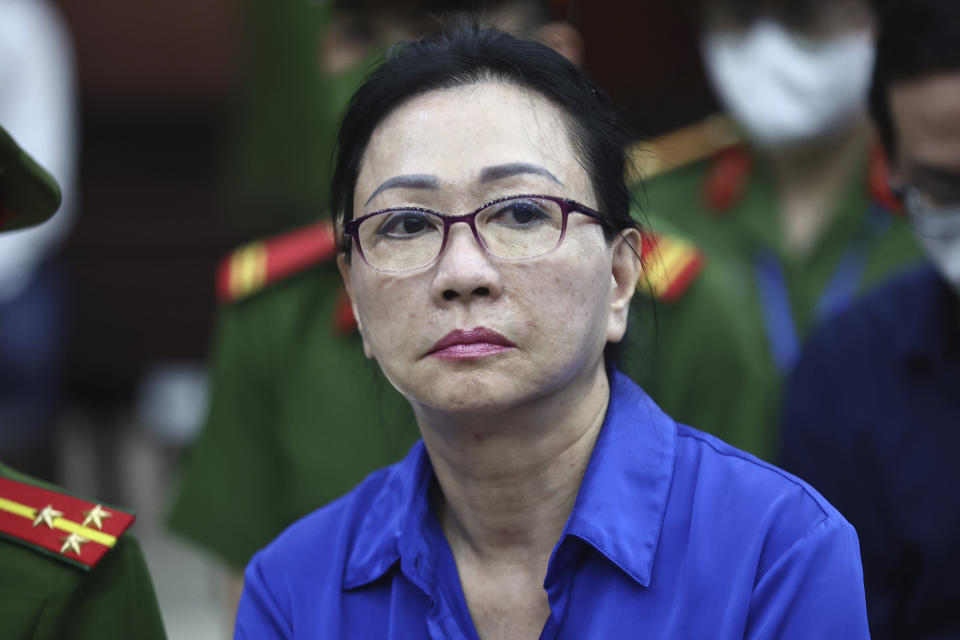
The death sentence of Vietnamese tycoon Truong My Lan was upheld in a significant fraud case
Vietnamese business magnate Truong My Lan, who was given a death sentence for $44 billion in fraud, had to pay back $9 billion to stay out of jail.
Truong My Lan, a Vietnamese real estate magnate, lost her appeal against her death sentence for orchestrating the largest bank fraud in history.
According to Vietnamese law, the 68-year-old’s sentence will be commuted to life in prison if she can repay 75% of what she took, putting her in a race for her life.
The trial court concluded in April that Truong My Lan had secretly controlled Saigon Commercial Bank, the fifth-largest lender in the nation, and had obtained loans and cash totaling $44 billion (£34.5 billion) over more than a decade through a network of shell firms.
Of that, prosecutors claim that $27 billion was embezzled, the most serious financial felony for which she received a death sentence, and $12 billion was misappropriated.
She is one of the very few women in Vietnam to receive a death sentence for a white collar crime, which was an unusual and startling decision.
The court ruled on Tuesday that there was no justification for lowering Truong My Lan’s death sentence.
She could still escape execution, though, if she returns $9 billion, or three-quarters of the $12 billion she stole. She can still ask the president for amnesty, so this is not her last appeal.
Truong My Lan was occasionally belligerent during her trial, but she was more remorseful during the most recent hearings for her appeal against the punishment.
She claimed that she was ashamed of being such a burden on the state and that her main concern was returning the money she had stolen.
Truong My Lan, who was born into a Sino-Vietnamese household in Ho Chi Minh City, began her career selling cosmetics at market stalls alongside her mother.
Following the Communist Party’s introduction of economic liberalization in 1986, she started purchasing real estate. She had a sizable portfolio of hotels and eateries by the 1990s.
She was the head of the well-known real estate company Van Thinh Phat Group when she was found guilty and given her sentence in April. It was a pivotal point in the anti-corruption drive known as “Blazing Furnaces,” which was spearheaded by Nguyen Phu Trong, the secretary-general of the Communist Party at the time.
The remaining 85 accused were all found guilty. The remaining inmates received prison sentences ranging from 20 years to three years with a three-year suspension, while four received life sentences. The husband and niece of Truong My Lan were sentenced to nine and seventeen years in prison, respectively.
It is estimated that the State Bank of Vietnam recapitalized Saigon Commercial Bank for billions of dollars in order to avert a more widespread banking crisis. Her crimes were “huge and without precedent,” according to the prosecutors, and they did not warrant leniency.
According to Truong My Lan’s attorneys, she was making every effort to locate the $9 billion that was required. However, it’s been challenging to cash in her holdings.
In principle, some of the upscale homes in Ho Chi Minh City may be sold rapidly.
Others take the shape of stock or interests in other companies or real estate ventures.
Over a thousand distinct assets have been connected to the scam by the state.
For the time being, the authorities have frozen these. In order to help her attain the goal, the tycoon has also asked acquaintances for loans.
On the basis of money, her attorneys have urged the courts to be lenient. They said that she would find it difficult to negotiate the best price for the sale of her interests and assets while she is serving a death sentence, making it more difficult for her to raise the $9 billion.
They claim she would fare far better if she were given a life sentence instead.
Before her appeal was denied, attorney Nguyen Huy Thiep stated, “The total value of her holdings actually exceeds the required compensation amount.”
However, since many of the assets are real estate and take time to dispose, selling these takes time and effort. Truong My Lan is hopeful that the court will establish the best terms possible so that she may keep providing compensation.
Few had anticipated that these arguments would move the judges. In a sense, she is now competing with the executioner to get the money she requires.
The death penalty is considered a state secret in Vietnam. Human rights organizations claim that there are over 1,000 people on death row and that Vietnam is one of the largest executioners in the world, although the government does not disclose the exact number.
Although inmates are given very little notice, there are usually lengthy delays—often years—before sentences are carried out.
Truong My Lan’s life will probably be saved if she can retrieve the $9 billion before then.
All Categories
Recent Posts
Tags
+13162306000
zoneyetu@yahoo.com


